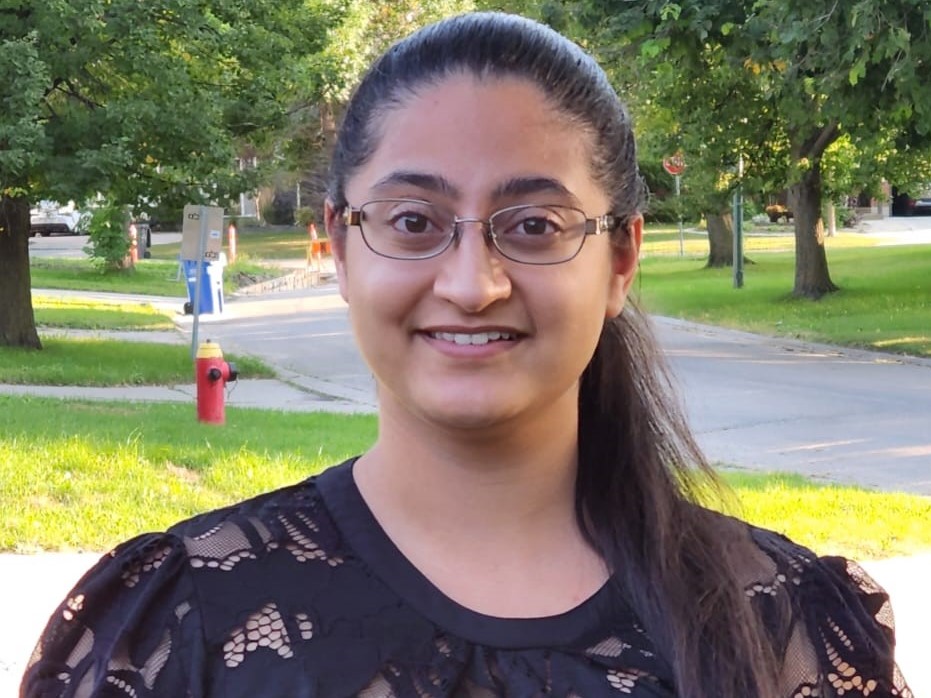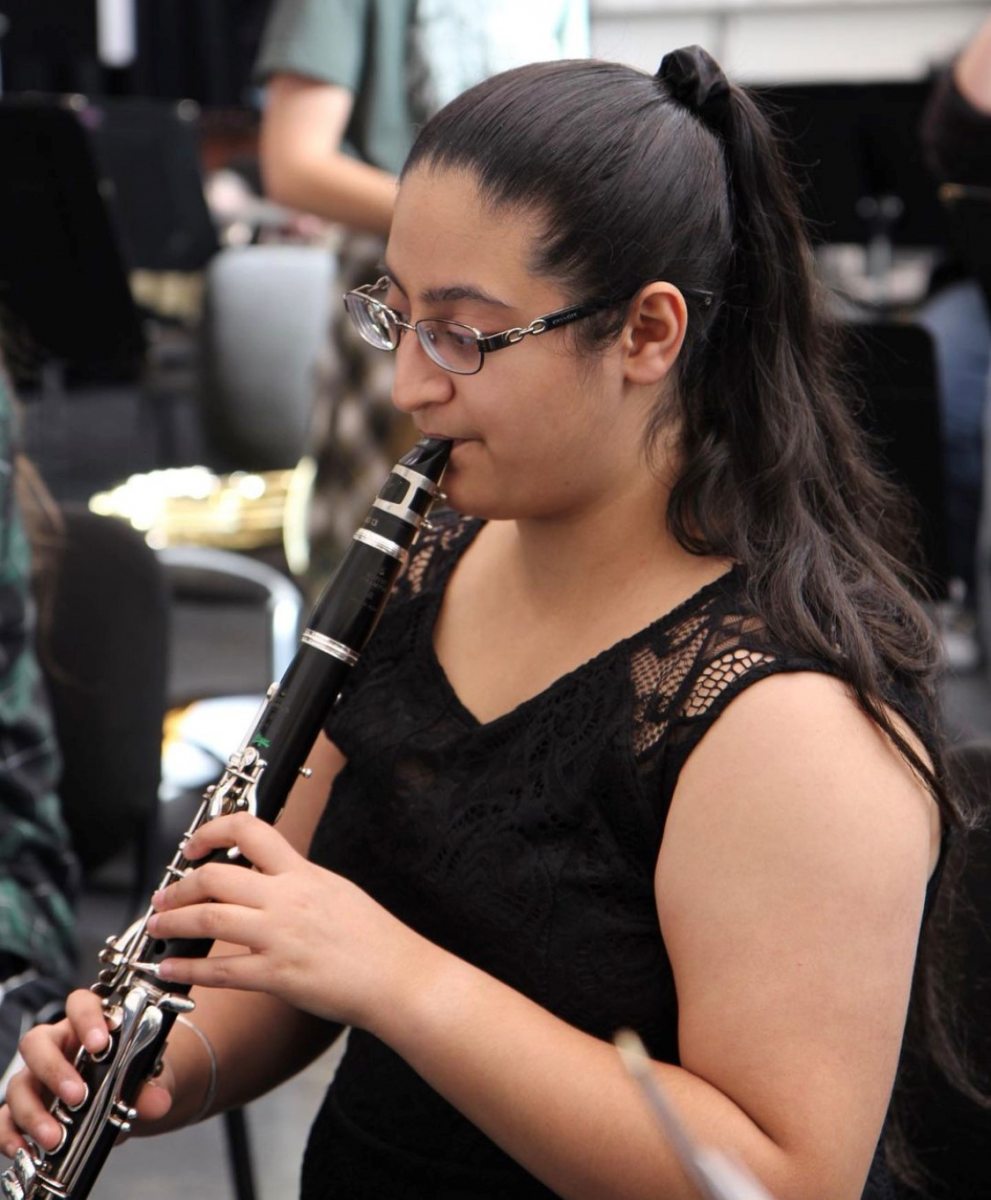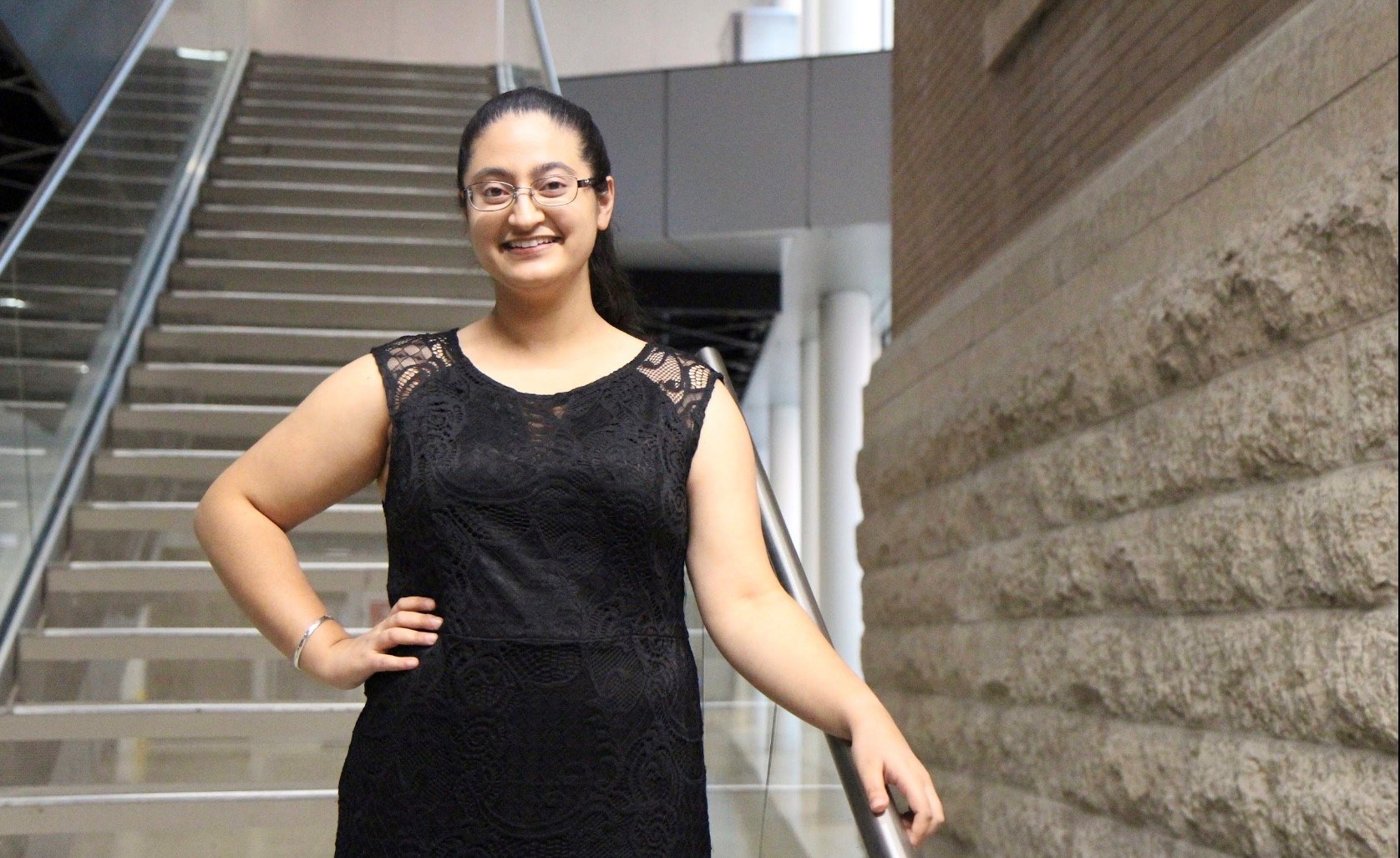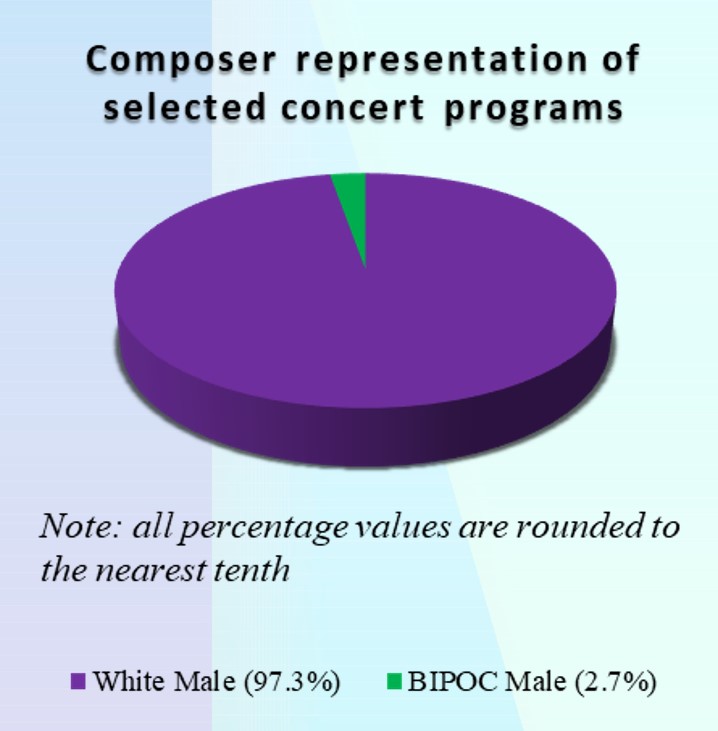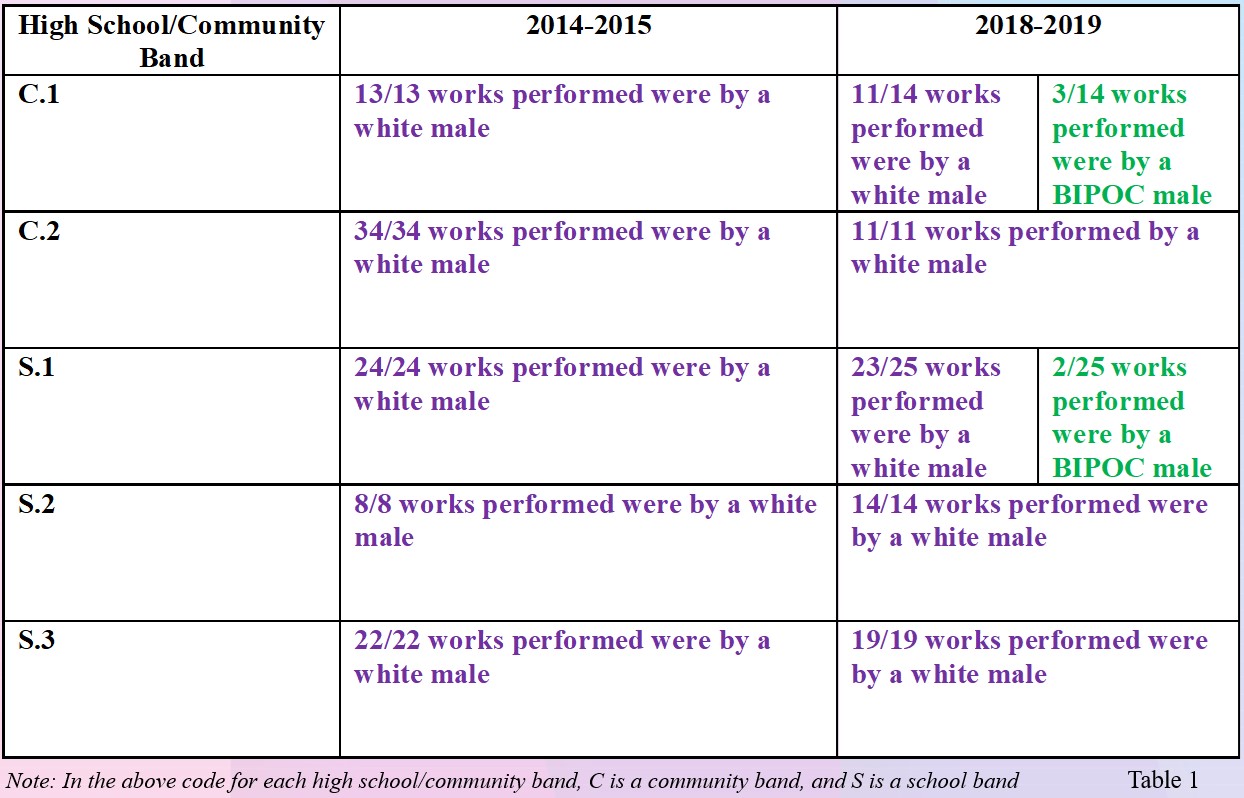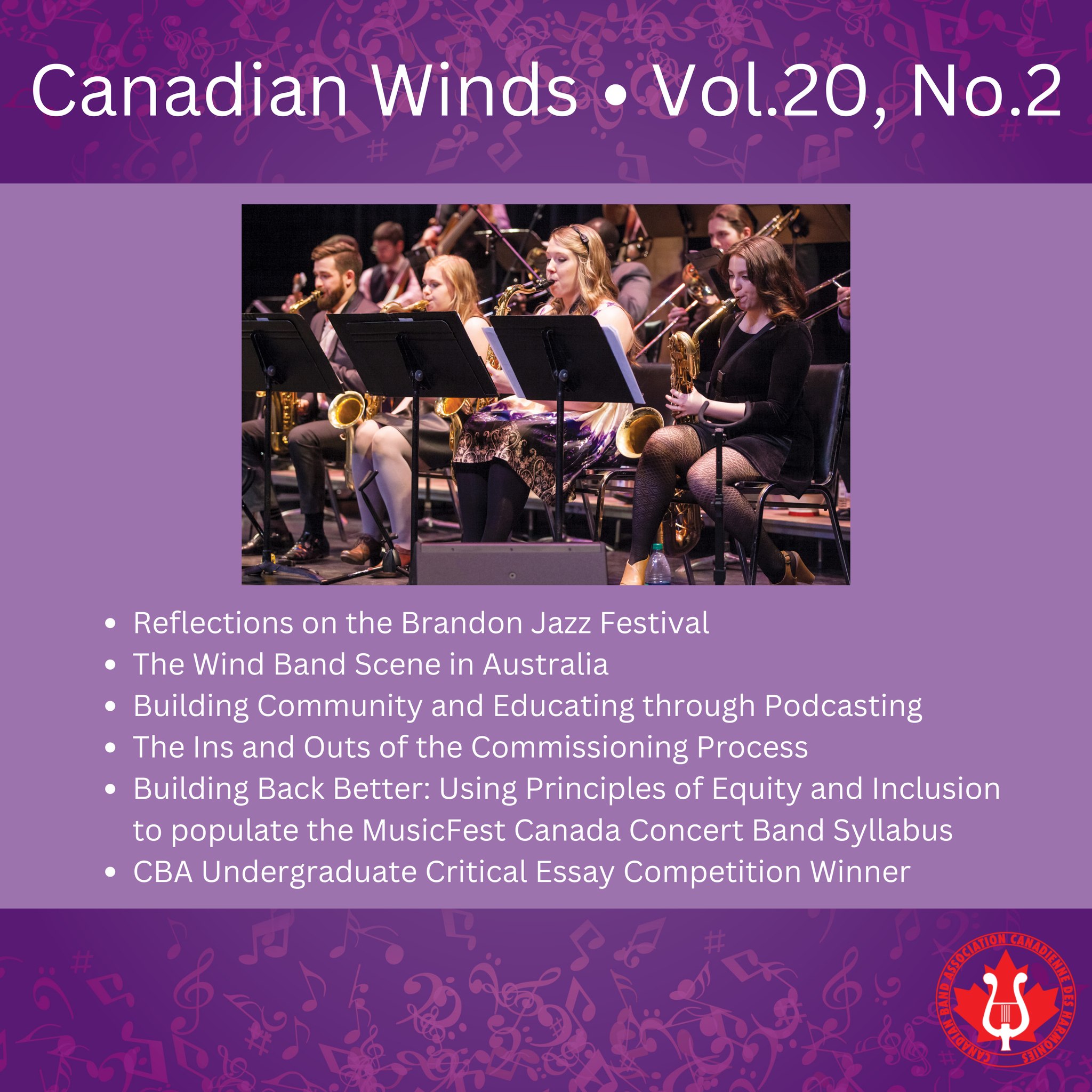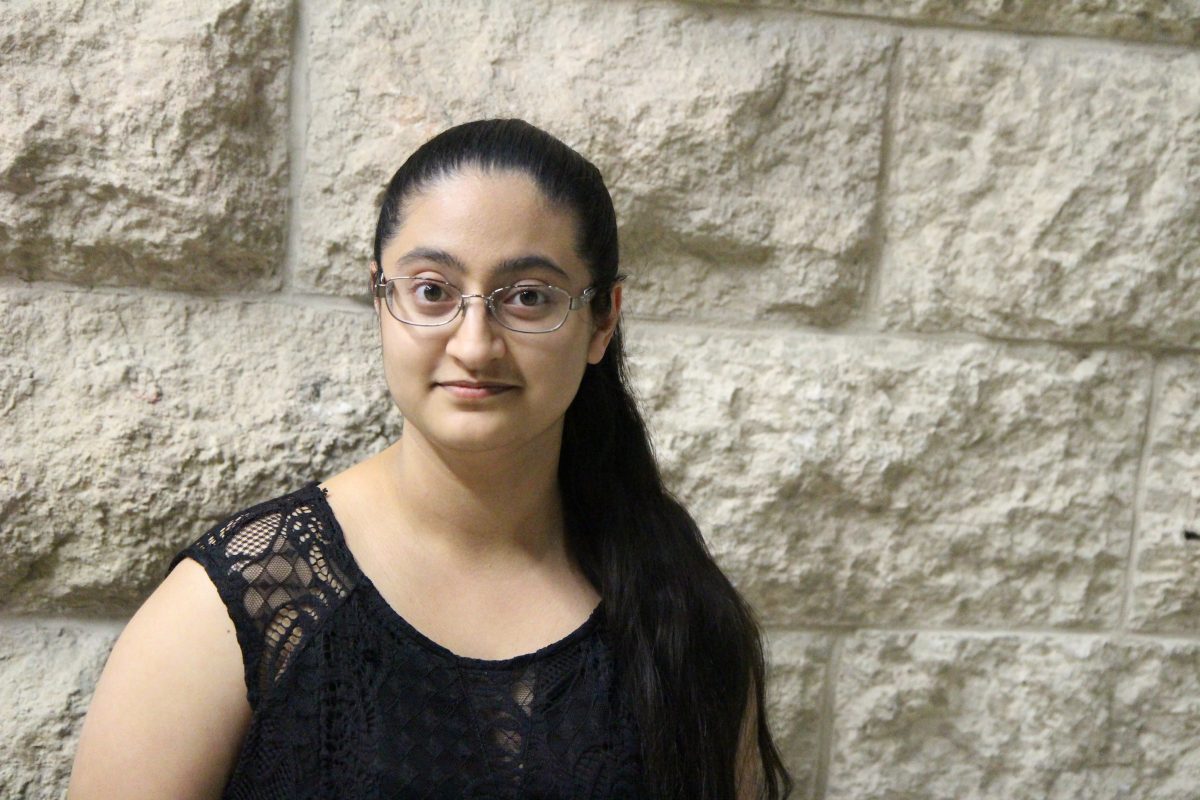
Conducting research about what is conducted
Ikjyot Bharaj is shining a light on representation in music repertoire
Winnipeg is home to one of the most diverse populations in a major metropolitan area in Canada, with over 43 percent of residents identifying as a race other than Caucasian, and with more Indigenous residents (12.4 percent) than any other major Canadian city. Every summer, the city comes alive as residents flock to Folklorama, the largest and longest-running multicultural festival of its kind in the world, to experience the dances, music, events and food of the many different cultures represented in Winnipeg.
Such a wealth of diversity in the area must surely mean that those different cultures and races are represented in the music that is taught and performed in Winnipeg wind and concert bands, too, right?
Desautels Faculty of Music student Ikjyot Bharaj aimed to find out, and her resulting research has now been published by a national academic journal!
Representation matters
Ikjyot Bharaj is a fourth-year music education major who will be graduating this spring, and plays clarinet in the University of Manitoba Wind Ensemble. She grew up in Winnipeg, Manitoba, attending Arthur A. Leach Junior High School and Vincent Massey Collegiate, where her love of music was fostered.
“A large reason I decided to go into music is because I have been inspired by previous music educators who loved what they did,” she says.
“I will never forget how all of my music educators shared their joy of music with us, and constantly provided opportunities to grow both musically and as a person,” Ikjyot adds.
“I have been in the fortunate position where nearly everyone in my life has encouraged me and supported me to continue doing what I love,” says Ikjyot of her decision to pursue a career in the field of music.
That said, she knows a thing or two about representation, or the lack thereof, in music.
“I grew up feeling that it was typical to feel underrepresented, particularly in the realm of western art music,” says Ikjyot, whose family is of Punjab heritage.
She became interested in the topic of equity, diversity and inclusion (EDI) in university, and decided that she would like to conduct research on the subject as it pertains to music.
“I knew I wanted my research to focus on wind band music so that I could apply what I learned to practical teaching situations,” she says.
“Because Dr. Dawson knew that I would like to focus on wind band and topics of EDI, she guided me to some relevant research in the area,” explains Ikjyot of her Wind Ensemble director Jacquie Dawson, an assistant professor of conducting and the Director of Bands in the Desautels Faculty of Music.
“I did not realize exactly how poorly represented most of the Canadian population was in most music studied in schools until I read more about the topic,” she says.
One of the resources she studied was the 2020 edition of the Canadian Winds journal, the scholarly publication of the Canadian Band Association, which contained several articles focusing on EDI. Of particular interest to Ikjyot was an article by Canadian conductor Pratik Gandhi.
“Gandhi found that of Canadian band syllabus lists from 2020, one percent of the music was composed by BIPOC [black, Indigenous, and other people of colour] women, 3.4 percent by BIPOC men, 3.8 percent by women, and 91.8 percent by white male composers,” she says of the article.
“This degree of underrepresentation in festival lists made me wonder what the composer representation might look look in schools and community bands, who often have more liberty over the repertoire chosen,” says Ikjyot of the spark that ignited her research.
Finding support for research
With a solid idea of what she wanted to study, Ikjyot now had to find the resources needed to conduct her research. Fortunately, Desautels Faculty of Music professors and the University of Manitoba had her back.
“Initially, Dr. Stark [Jody Stark, associate professor in the Desautels Faculty of Music] mentioned the Undergraduate Research Awards program to me,” says Ikjyot.
The Undergraduate Research Awards (URA) are competitive grants awarded to UM undergraduate students in all fields and ranges of research, scholarly works, or creative activities. Students apply to be mentored for sixteen weeks by a professor of their choice, and, if selected for an award, they receive a $7,000 monetary award to conduct their research.
For her application, Ikjyot asked both Dr. Stark and Dr. Dawson if they would be willing to mentor her. Both agreed. Ultimately, the university found her intended research subject to be worthy of an award.
With funding secured, she got to work with her mentors.
“Dr. Dawson helped prepare me for the research and provided guidance throughout every step of he URA program,” says Ikjyot.
“She led me to articles and other resources, assisted in the process of the human ethics proposal, brought up several considerations that I had not necessarily thought of making, as I am new to music research, and much more,” says Ikjyot of the support she received from Dawson.
“I also received guidance from Dr. Stark when submitting the human ethics proposal and when exploring various qualitative research methodologies so I could decide how I may want to conduct the part of the research involving interviews with composers and music educators,” she says.
“I am very thankful for their mentorship, support, and guidance.”
For their part, Dawson and Stark were very pleased to work with Ikjyot.
“Ikjyot is a bright student with great potential, and she will be an amazing role model for her future students and colleagues,” says Stark.
“She’s a very intelligent student who pursues her work with incredible purpose and professional curiosity,” says Dawson.
“She is engaging in critical conversation and work in the field and already making a meaningful contribution,” adds Dawson of the work that Ikjyot is doing.
Designing research
Though she wanted to conduct interviews with composers and music educators regarding how to increase composer diversity in wind band music, she needed to submit a human ethics proposal that would not be approved until fall of 2020, and she had a deadline of the summer of 2020 to complete her research.
“Instead, I worked on a preliminary study, which investigated the composer and arranger representation of music programmed for Winnipeg-based high school and community bands,” she says of the first part of her research.
“In addition to trying to gain as much insight as possible, I needed to make sure that the research was fair and accurate,” says Ikjyot of her approach to designing the research parameters.
She restricted her scope to studying bands in the Winnipeg area, and chose to randomly select four high school wind bands and four community wind bands, so that she would not end up with an overwhelming amount of data points to compile.
She chose to focus on high school bands because works chosen for junior high bands are typically chosen for their entry-level playing, so the repertoire lists might look different, composition-wise.
“Generally, repertoire played by high school and community bands would be more directly comparable,” she says.
She also excluded jazz bands from her research, since repertoire for jazz looks entirely different than that of wind bands, and as such, might skew the sampling.
After careful consideration, Ikjyot decided to divide all of the schools into their respective school divisions in order to ensure that her research would include representation from all corners of Winnipeg. She assigned a number to all of the schools in each division, and then, using a random number generator, randomly selected the schools. She did the same for the community bands.
Ultimately, she was able to gather the concert programs from three high schools and two community bands for the 2014-2015 and 2018-2019 school years.
With the data points in hand, she began the process of analysis.
It was eye-opening.
Lack of diversity in a diverse city
When it came to the community bands, Ikjyot found that 100 percent of the compositions for the 2014-2015 performance season (a total of 47 compositions) were written by white male composers, in both groups. In the 2018-2019 performance season, 22 of 24 compositions were written by white male composers, and three were composed by a BIPOC male.
For high schools, 100 percent of the compositions performed in the 2014-2015 school year were composed by white men, 54 pieces in total. In the 2018-2019 school year, 56 of the 58 compositions performs by the three schools were written by a white man. Two were written by a BIPOC man.
None of the five groups studied performed even a single work by a woman composer of any race in either the 2014-2015 or 2018-2019 period.
“I expected that there would be little representation of BIPOC composers and arrangers,” says Ikjyot.
“However, I did not expect there to be NO female representation,” she laments.
She also notes that three of the five compositions from a BIPOC composer were from the same composer, Owen Williams, which meant that the works came from only three BIPOC composers. The other two composers were Naohiro Iwai and Benjamin Yeo.
“In addition, I was shocked that three of the five ensembles in the study included solely white male composers in both of the periods studied,” she says.
Shining a light on a problem
Such compelling results deserved to be read by an audience able to do something about the problem.
“Dr. Dawson encouraged me to submit the research findings to the Canadian Winds Critical Essay Writing Competition,” says Ikjyot.
The Canadian Band Association sponsors the competitive Undergraduate Critical Essay Competition annually, and the winner is published in Canadian Winds, the association’s national academic journal.
Ikjyot submitted her essay, and ultimately won the competition. It’s not difficult to see why. Her robust sampling methods and analysis of the study show a very bright mind with a keen eye for detail and critical thinking. Her research was published in the Spring 2022 issue of the journal (Vol. 20, No. 2) with the title “Decolonizing the Band Room Through Repertoire Selection: Content Analysis of Programming in Winnipeg-Based Band Concerts.”
“Music educator Brandi Wallace-Pace explains the process of decolonization as ‘…learning about the effects of colonization on people, land, systems, ideas, education, etc. and listening to the voices of those victimized by it in order to disrupt and attempt to repair it,’” says Ikjyot.
“Programming music from a more diverse demographic of composers is one of many ways that we can attempt to move forward in a positive direction in terms of decolonizing band room spaces,” she says.
However, she notes that that is only the beginning.
“Regardless of our own backgrounds, it is important to actively seek more and more understanding of the harms of colonization. Doing so not only prevents further harm, but also provides ideas of what needs to be done differently,” she explains.
Next steps
Having already secured approval for her human ethics proposal in the Fall of 2020, Ikjyot applied for the URA again for the following summer so that she could conduct her interviews. Again, she received the award to continue her research! In the summer of 2022, she began the process of interviewing composers, music educators, composition teachers, and wind band composers, including both composers who are well-represented and those who are not. She focused on discussing solutions for improving equity, diversity, and inclusion in band repertoire. She analyzed the interviews to for trends in proposed solutions that can be adopted and utilized by a variety of musicians, teachers and conductors.
“I am currently in the process of summarizing these findings so they can be presented in another paper,” she says of her ongoing work.
Ikjyot hopes that people who read her research will come to understand the value and importance of including the works of composers from diverse backgrounds.
Some of the research she sites in her article studied career-long disparities based on lack of representation in an emerging composer’s early career. A computer simulation and algorithm by researcher Emily Doolittle compared the difference between a female composer’s career versus a male composer’s career. All other variables held equal, it found that just a five percent difference in the number of works performed at the beginning of a female composer’s career versus a male composer’s career would, thirty year down the road, result in a difference of 38 performances per year (the male composer is estimated to have 66 performances of his works, while the female composer would have 28 performances of her works annually). One can imagine that the results would be similar, or even more glaringly disparate, for BIPOC composers. Doolittle notes that this has “real consequences for who gets to continue being a composer.”
“One of the main messages of the article is to consider the representation of composers, especially if one is in a position to program music. To increase composer diversity and representation within one’s own program, this would likely require learning new music, purchasing new music, or borrowing music from other band programs. Because of the need to increase composer diversity and representation, I am hopeful that band directors see these as worthwhile efforts and investments,” she says.
She offers a few suggestions about how band directors can increase diversity in repertoire selection.
In her research, Ikjyot noted that many band directors say that they prefer to choose a piece that they can listen to before purchasing for their band. New, young, and contemporary composers tend to have fewer works recorded by bands, which becomes a catch-22 for their career. People can’t listen to a sample of their work, so they choose not to purchase the scores, which prevents the composer from being able to make a living.
“I think it’s important that band teachers are aware of this issue so that they can make a conscious effort to collaborate with composers from underrepresented backgrounds,” says Ikjyot.
“If bands offered to record music so that composers had a recording they could share with others, as opposed to simply providing a Midi file [a computer-generated, often tinny, simulation of the piece], this would be helpful,” she offers.
She also encourages band directors to commission new band pieces from underrepresented composers if they are in a position to do so.
“This is a way to directly encourage increasing composer diversity in wind band music. It would also be a valuable experience for students to view the process of a band piece coming to life,” she says.
Using social media to share performances, or simply telling other directors what music they are programming for their students is another way that band directors can help increase the reach of a composer from an underrepresented background.
“This may encourage other band directors to consider performing the same pieces at some point, or to consider performing other pieces by the composer or arranger.
What’s next
As for what’s next for HER, Ikjyot already has it all planned out.
“Over the course of my junior high and high school education, I became a firm believer that music is a powerful tool through which a limitless variety of material and subject matter can be taught and learned. Pursuing music education thus felt like a very natural next step,” she says.
She is also very thankful for her community.
“I really want to thank my professors, teachers, peers, friends, and family members for sharing [my research] through social media and for supporting me over the course of my music studies,” she says of her journey.
With her graduation from the Desautels Faculty of Music slated for this spring, Ikjyot will enter the University of Manitoba Faculty of Education to continue her studies, with a focus on the senior years stream. Ultimately, she hopes to become the same kind of middle years and senior years band teacher as the ones who inspired and supported her throughout her education.
“The Desautels Faculty of Music is very proud of Ikjyot and that she has been part of our community for the past four years. We look forward to the next steps in her very bright future as a music educator!” says Dawson enthusiastically.







